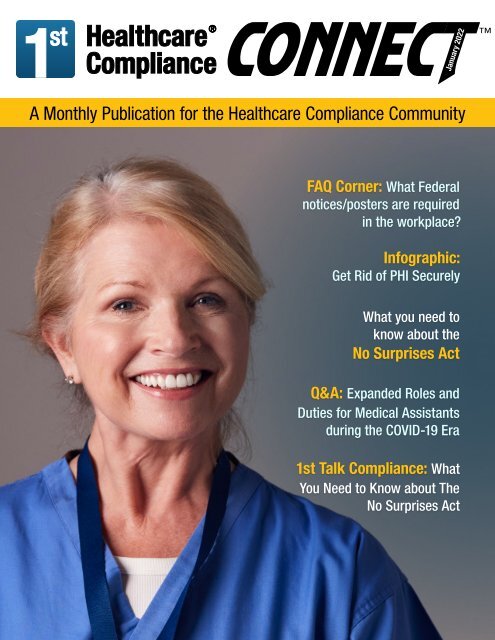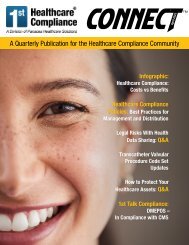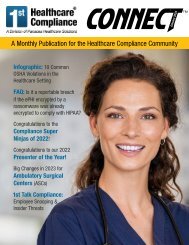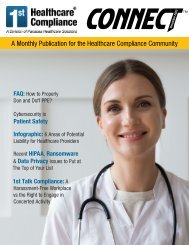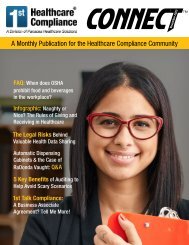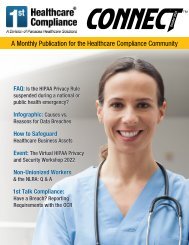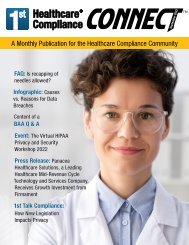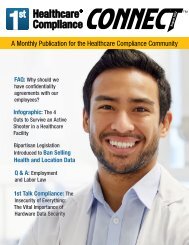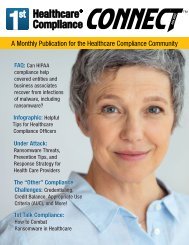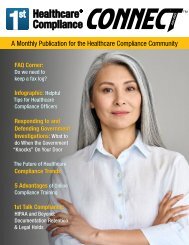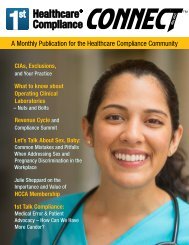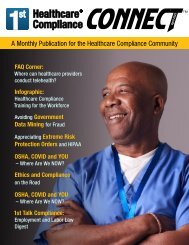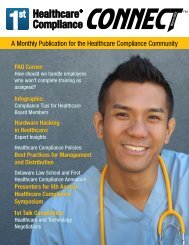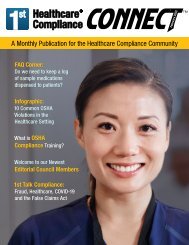First Healthcare Compliance CONNECT January 2022
You also want an ePaper? Increase the reach of your titles
YUMPU automatically turns print PDFs into web optimized ePapers that Google loves.
<strong>CONNECT</strong><br />
<strong>January</strong> <strong>2022</strong><br />
<br />
A Monthly Publication for the <strong>Healthcare</strong> <strong>Compliance</strong> Community<br />
FAQ Corner: What Federal<br />
notices/posters are required<br />
in the workplace?<br />
Infographic:<br />
Get Rid of PHI Securely<br />
What you need to<br />
know about the<br />
No Surprises Act<br />
Q&A: Expanded Roles and<br />
Duties for Medical Assistants<br />
during the COVID-19 Era<br />
1st Talk <strong>Compliance</strong>: What<br />
You Need to Know about The<br />
No Surprises Act
Got a Minute? Please Rate Us!<br />
The health of our company depends on the members<br />
of our community spreading the word about us.<br />
Share Your Success Story<br />
An endorsement by you is the greatest compliment<br />
we could receive! Please take a moment of your time<br />
to rate us online so that others can benefit from your<br />
experience. It’s a simple way to help us grow and<br />
improve.<br />
We appreciate your support and look forward to<br />
hearing from you!<br />
In This Issue:<br />
<strong>Compliance</strong> Super Ninja<br />
FAQ Corner: What Federal notices/posters are<br />
required in the workplace?<br />
Infographic: Get Rid of PHI Securely<br />
What you need to know about the No<br />
Surprises Act<br />
Q&A: Expanded Roles and Duties for Medical<br />
Assistants during the COVID-19 Era<br />
2<br />
<strong>First</strong> <strong>Healthcare</strong> <strong>Compliance</strong>, LLC © <strong>2022</strong>
<strong>Compliance</strong> Super Ninja <br />
Tanna Dotson, Clinic Manager<br />
Associated Vitreoretinal & Uveitis Consultants<br />
How would you describe your experience with <strong>First</strong> <strong>Healthcare</strong> <strong>Compliance</strong>?<br />
Great, when I started at this practice 15 years ago, we only had 12 employees and now we’ve grown to almost<br />
50. Having <strong>First</strong> <strong>Healthcare</strong> <strong>Compliance</strong> has greatly improved our compliance and helped me transition to a<br />
large practice.<br />
What do you enjoy most about working with Associated Vitreoretinal & Uveitis<br />
Consultants?<br />
We are a very busy retina practice in Indiana. We have four amazing doctors. I enjoy being a part of this team<br />
and the great work that we do each year.<br />
Would you rather have a two-bedroom apartment in a big city or a mansion in the<br />
countryside? Why?<br />
I would prefer to be in the countryside. My husband and I currently live on a few acres and it is a nice change<br />
from the busy roads and shops near work.<br />
1st Talk <strong>Compliance</strong>: The No Surprises Act –<br />
What You Need to Know<br />
COVID-19 <strong>Healthcare</strong> <strong>Compliance</strong> Toolkit<br />
Contact Toll Free: 888-54-FIRST 3
FAQ Corner<br />
What Federal notices/posters are required in the workplace?<br />
Employers are required to advise employees of their federal rights in the form of displaying federally required posters<br />
in the workplace. <strong>Compliance</strong> with these federal requirements are necessary to avoid strict fines and penalties. Here<br />
is a listing of posters that are required by federal law, including direct links:<br />
Fair Labor Standards Act (FLSA) Poster<br />
FSLA establishes minimum wages, overtime pay, record keeping and child labor standards for private sector and<br />
government workers.<br />
• Every employer of employees subject to the FLSA’s minimum wage provisions is required to display the poster.<br />
• The poster must be prominently displayed in all establishments, where it can be readily seen by employees.<br />
The Equal Employment Opportunity Poster<br />
The Equal Employer Opportunity Commission (EEOC) enforces federal non-discrimination laws which prohibit job<br />
discrimination based on race, color, sex, national origin, religion, age, equal pay, disability or genetic information.<br />
• Employers with 15 or more employees are required to display the poster.<br />
• The poster must be prominently displayed in all establishments, where it can be readily seen by employees and<br />
job applicants.<br />
The Most Comprehensive<br />
<strong>Healthcare</strong> <strong>Compliance</strong> Course<br />
The Fundamentals is a user-friendly, four-module<br />
online course designed to help healthcare professionals<br />
understand the essential principles and practices of<br />
compliance.<br />
BUY COURSE NOW<br />
4<br />
<strong>First</strong> <strong>Healthcare</strong> <strong>Compliance</strong>, LLC © <strong>2022</strong>
The Family And Medical Leave Act (FMLA)<br />
Poster<br />
The FMLA provides employees with 12 months of<br />
service and with at least 1,250 hours worked during the<br />
last 12 months with up to 12 weeks of job-protected,<br />
unpaid leave for: 1) the birth and care of a newborn<br />
child; 2) the placement for adoption of child; 3) one’s<br />
own serious health condition; or 4) the serious health<br />
condition of an immediate family member.<br />
• Every employer with 50 or more employees<br />
within a 75-mile radius is required to display<br />
the poster, even if there are no FMLA eligible<br />
employees.<br />
• The poster must be prominently displayed in all<br />
establishments, where it can be readily seen by<br />
employees and job applicants.<br />
Occupational Safety And Health Act<br />
(OSHA) Poster<br />
OSHA requires employers to provide employees with<br />
a workplace that is free from recognized hazards that<br />
are causing or likely to cause death or serious physical<br />
harm.<br />
• All private sector employers are required to<br />
display the poster.<br />
• The poster must be prominently displayed in all<br />
establishments, where it can be readily seen by<br />
employees.<br />
• Posters must be at least 8.5” x 14” inches with<br />
10 point type.<br />
• Although not a requirement, OSHA recommends<br />
employers to display the Spanish version<br />
of the poster if they have Spanish-speaking<br />
employees.<br />
The Employee Polygraph Protection Act<br />
(EPPA) Poster<br />
The EPPA prohibits employers from using lie detector<br />
tests for pre-employment screening of job applicants or<br />
for testing current employees.<br />
• All private sector employers are required to<br />
display the poster.<br />
• The poster must be prominently displayed in all<br />
establishments, where it can be readily seen by<br />
employees and job applicants.<br />
Uniformed Services Employment And<br />
Reemployment Rights Act (USERRA)<br />
The USERRA requires that returning service members<br />
are entitled to receive all rights and benefits of<br />
employment that they would have obtained if they had<br />
been continuously employed.<br />
• All employers are required to display the poster.<br />
• The poster must be prominently displayed in<br />
all establishments or distributed in full text to<br />
employees in writing or via electronic mail.<br />
In addition to federal requirements, employers should<br />
check with their respective state agencies regarding<br />
required posters or notices.<br />
Explore the FAQs tab in your compliance solution<br />
to find answers to your compliance questions!<br />
CLIENT<br />
ALERT<br />
Contact Toll Free: 888-54-FIRST 5
6<br />
<strong>First</strong> <strong>Healthcare</strong> <strong>Compliance</strong>, LLC © <strong>2022</strong>
Risk Management Considerations for<br />
the <strong>Healthcare</strong> <strong>Compliance</strong> Officer:<br />
Training, Incident Management, Governing Boards,<br />
and Measures Unique to COVID-19<br />
It’s no secret that healthcare is one of America’s most heavily regulated<br />
industries with substantial fines and penalties for non-compliance. Complex<br />
regulations and mandates make compliance management a necessity.<br />
<strong>Healthcare</strong> organizations particularly rely on the skills and attributes of their<br />
compliance officer to navigate the expansive regulatory framework.<br />
DOWNLOAD NOW<br />
Contact Toll Free: 888-54-FIRST 7
What You Need To Know<br />
About The No Surprises Act<br />
Guest Author<br />
Rachel V. Rose, JD, MBA<br />
Enacted in late 2020 as part of the<br />
Consolidated Appropriations Act of 2021<br />
with an effective date of Jan. 1, <strong>2022</strong>, the No<br />
Surprises Act (NSA) underscores its primary<br />
purpose is to protect patients from surprise<br />
medical bills when receiving certain services<br />
from – emergency services, non-emergency<br />
services from nonparticipating providers at<br />
participating facilities, and air ambulance<br />
service from nonparticipating providers. (86<br />
Fed. Reg. 36872 (Jul. 13, 2021)).<br />
Essentially, the NSA does three things: (1) limits<br />
a patient’s cost-sharing to in-network levels; (2)<br />
prohibits balance billing; and (3) establishes an<br />
independent dispute resolution process (IDR). The<br />
NSA’s IDR enables payors and providers to resolve<br />
disputes over provider payments. 86 Fed. Reg. at<br />
36875–76. As the Centers for Medicare and Medicaid<br />
Services (CMS) state, “[m]ost group health plans<br />
and health insurance issuers that offer group or<br />
individual health insurance coverage have a network<br />
of providers and health care facilities (in-network<br />
providers) that agree to accept a specific payment<br />
amount for their services.”<br />
Three federal agencies are tasked with implementing<br />
the NSA – Department of Treasury, Department of<br />
Labor, and the Department of Health and Human<br />
Services (collectively “Agencies”). These Agencies<br />
have published two sets of Interim Final Rules (IFRs)<br />
and a Notice of Proposed Rulemaking in preparation<br />
for the NSA’s effective date.<br />
The Oct. 7, 2021, IFR addresses the IDR process.<br />
There is a comment period that closed on Dec. 6,<br />
2021. Here are the steps that are outlined in the<br />
Federal Register:<br />
• Initiating party sends a required form with<br />
sufficient information to identify the disputed<br />
services within 30 business days from the date<br />
the provider or facility receives initial payment<br />
or denial of payment. This 30-business-day<br />
open negotiation period enables the parties to<br />
negotiate an agreed rate by the last day and if<br />
an agreement is not reached, then either party<br />
may initiate IDR.<br />
• To initiate IDR, within four business days<br />
following the end of an open negotiation period,<br />
a party submits a notice through the federal IDR<br />
portal, which is a public website maintained by<br />
CMS.<br />
8<br />
<strong>First</strong> <strong>Healthcare</strong> <strong>Compliance</strong>, LLC © <strong>2022</strong>
• The initiating party must do the following:<br />
identify its preferred, certified IDR entity and<br />
include material information about the dispute,<br />
including the “qualifying payment amount”<br />
(QPA). The QPA is basically the plan or issuer’s<br />
median in-network rate.<br />
• Once the IDR entity is selected, within 10<br />
business days, the parties each submit<br />
a respective offer for a payment amount<br />
expressed both as a dollar amount and as a<br />
percentage of the QPA. A description of the<br />
party is also required – for example a provider’s<br />
practice size and specialty. Other information<br />
may also be submitted; however, there are also<br />
exclusions such as the Medicare Fee Schedule.<br />
• Within 30 business days after the IDR entity’s<br />
selection, the IDR entity must select one of the<br />
offers submitted and are required to choose<br />
the offer closest to the QPA, unless additional<br />
material information on a variety of different<br />
subjects (e.g., market share in relation to the<br />
relevant geographic region).<br />
There is a lot to digest and care should be taken to<br />
calendar each step. Creating a checklist with the<br />
dates and response times is a good place to start. In<br />
sum, there is little doubt that this federal IDR process<br />
represents a significant change in the way out-ofnetwork<br />
services are paid.<br />
Be sure to watch the webinar by Rachel V. Rose called<br />
The No Surprises Act – What You Need to Know.<br />
C. Trey Scott, Coordinating Attorney at<br />
COVID-19 <strong>Healthcare</strong><br />
Kennedy, Attorneys & Counselors at Law<br />
will present Under Pressure: Reporting<br />
<strong>Compliance</strong><br />
Appeals<br />
Toolkit<br />
for the Fifth Circuit.<br />
Requirements with OCR for Breaches at the<br />
upcoming Virtual HIPAA Privacy and Security<br />
Summit 2021 <strong>Healthcare</strong> on November compliance 18. amidst COVID-19 Summit! presents new challenges<br />
for hospitals and healthcare providers. At top importance is the<br />
Trey received his Bachelor of Science and Master of<br />
Business degrees<br />
question<br />
from Texas<br />
of<br />
Tech<br />
how<br />
University<br />
to slow<br />
and his<br />
or stop the spread of COVID-19, while<br />
ensuring that your organization stays compliant.<br />
Juris Doctorate from Texas Wesleyan University School<br />
of Law (now Texas A&M University School of Law.) While<br />
in law school, Trey was Now a member more than of the ever, arbitration your compliance department needs to have the<br />
necessary tools to help track, analyze, and respond to compliance challenges.<br />
competition team as well as a student bar association<br />
To help navigate the process, we’ve gathered our best COVID-19 resources<br />
representative. He also was a law clerk to the 106th<br />
below. If you need further assistance, please contact us here.<br />
District Court of the State of Texas. Trey has significant<br />
experience in healthcare law. This experience includes:<br />
medical malpractice litigation, administrative and<br />
regulatory appeals and disputes, professional board<br />
VIEW TOOLKIT<br />
United States District Courts for the Northern, Southern,<br />
Eastern, and Western Districts of Texas. Trey is also<br />
licensed to practice before the United States Court of<br />
Click here for more information or to register for the<br />
matters, and overpayment disputes. Trey is licensed to<br />
practice law before Texas State Courts as well as the<br />
Contact Toll Free: 888-54-FIRST 9
Q&A: Expanded Roles and Duties<br />
for Medical Assistants during the<br />
COVID-19 Era<br />
Catherine Short<br />
Donald A. Balasa, JD, MBA, CEO and Legal<br />
Counsel at American Association of Medical<br />
Assistants (AAMA), presented the webinar<br />
“Expanded Roles and Duties for Medical<br />
Assistants during the COVID-19 Era” on<br />
April 13th. Mr. Balasa answered these<br />
questions in anticipation of the webinar.<br />
You mentioned that medical assistants can be<br />
certified although not licensed in nearly every<br />
state. How are you defining licensing and<br />
certification?<br />
Licensing is a mandatory, usually state, credential<br />
without which an individual is prohibited legally from<br />
working in a profession or occupation. Certification is<br />
a voluntary credential, usually national in scope, that<br />
is awarded by a private sector (usually) certifying body.<br />
The CMA (AAMA) is a national certification for medical<br />
assistants.<br />
Are medical assistants permitted to perform<br />
nasopharyngeal swabbing for COVID-19 testing?<br />
Medical assistants are permitted to perform<br />
nasopharyngeal swabbing for COVID-19 testing under<br />
the laws of all states with the possible exception of<br />
California. Medical assistants must be under the<br />
authority and supervision of a licensed provider (e.g.,<br />
physician, osteopath, nurse practitioner, physician<br />
assistant) or a licensed health care professional (e.g.,<br />
registered nurse) when performing nasopharyngeal<br />
swabbing.<br />
Do any federal agencies have a position on<br />
medical assistants performing nasopharyngeal<br />
swabbing?<br />
The Centers for Medicare & Medicaid Services (CMS)<br />
published an interim final rule with comment period<br />
entitled “Medicare and Medicaid Programs; Policy and<br />
Regulatory Revisions in Response to the COVID-19 Public<br />
Health Emergency” (85 FR 19247 through 19253) in the<br />
April 6, 2020, Federal Register. Its language supports my<br />
legal position that medical assistants are permitted to<br />
perform nasopharyngeal swabbing to test for COVID-19.<br />
Note the following excerpts from this CMS rule:<br />
Even if the patient is confined to the home because of a<br />
suspected diagnosis of an infectious disease as part of a<br />
pandemic event … a nasal or throat culture … could be<br />
obtained by an appropriately-trained medical assistant or<br />
laboratory technician. …<br />
… Services furnished by auxiliary personnel (such as<br />
nurses, medical assistants, or other clinical personnel<br />
10<br />
<strong>First</strong> <strong>Healthcare</strong> <strong>Compliance</strong>, LLC © <strong>2022</strong>
acting under the supervision of the [rural health clinic]<br />
or [federally qualified health center] practitioner) are<br />
considered to be incident to the visit and are included in<br />
the per-visit payment.<br />
Are medical assistants permitted to administer<br />
COVID-19 vaccinations?<br />
Under the laws of most states, medical assistants are<br />
permitted to administer COVID-19 vaccinations under<br />
the authority and supervision of a licensed health care<br />
provider or a licensed health care professional.<br />
Do any federal agencies have a position on this?<br />
Medical assistants are classified as “vaccinators” for<br />
the COVID-19 vaccine under the COVID-19 Vaccination<br />
Program. Read more in the COVID-19 Vaccination<br />
Program Interim Playbook for Jurisdiction Operations<br />
(2nd version) via the Centers for Disease Control and<br />
Prevention (CDC) website.<br />
What is the position of nursing organizations<br />
on delegating the administration of COVID-19<br />
vaccinations?<br />
In its December 15, 2020, policy brief on COVID-19<br />
vaccine administration, the National Council of State<br />
Boards of Nursing—the membership organization for<br />
boards of nursing in American jurisdictions—stated<br />
that knowledgeable and competent “certified medical<br />
assistants” may be delegated COVID-19 vaccine<br />
administration.<br />
Are medical assistants permitted to perform<br />
telehealth tasks?<br />
Medical assistants are permitted to perform telehealth<br />
tasks as long as such tasks are within the scope of work<br />
of the medical assistant in the state in which the medical<br />
assistant is located.<br />
Do any federal agencies have a position on<br />
medical assistants in telehealth?<br />
In a 2020 guidance on how to expand access to health<br />
care during the COVID-19 pandemic, the Centers for<br />
Disease Control and Prevention affirmed that medical<br />
assistants and other health care professionals are<br />
permitted to interact with patients by several means.<br />
Note the following from this guidance:<br />
COVID-19 <strong>Healthcare</strong><br />
<strong>Compliance</strong> Updates<br />
In response to the global outbreak of the novel coronavirus<br />
disease (COVID-19), the Secretary of Health and Human<br />
Services declared a public health emergency on <strong>January</strong> 31,<br />
2020. Federal agencies have taken action by issuing updates<br />
and guidance to navigate the crisis. This ebook provides<br />
healthcare providers with important developments and<br />
resources that impact federal healthcare laws.<br />
DOWNLOAD NOW<br />
Contact Toll Free: 888-54-FIRST 11
Telehealth Modalities<br />
Several telehealth modalities allow [health care<br />
personnel] and patients to connect using technology to<br />
deliver health care:<br />
Synchronous: This includes real-time telephone or live<br />
audio-video interaction typically with a patient using a<br />
smartphone, tablet, or computer.<br />
In some cases, peripheral medical equipment (e.g.,<br />
digital stethoscopes, otoscopes, ultrasounds) can be<br />
used by another HCP (e.g., nurse, medical assistant<br />
[italics added]) physically with the patient, while<br />
the consulting medical provider conducts a remote<br />
evaluation.<br />
Asynchronous: This includes “store and forward”<br />
technology where messages, images, or data are<br />
collected at one point in time and interpreted or<br />
responded to later. Patient portals can facilitate this type<br />
of communication between provider and patient through<br />
secure messaging.<br />
Remote patient monitoring: This allows direct<br />
transmission of a patient’s clinical measurements from<br />
a distance (may or may not be in real time) to their<br />
healthcare provider.<br />
Scope of practice resources:<br />
AAMA website: www.aama-ntl.org<br />
• Check the right column of the homepage for<br />
COVID-19 updates.<br />
• Click below “State Scope of Practice Laws” near<br />
the left bottom of the homepage for the medical<br />
assisting laws of all states.<br />
• Put your cursor over “CMA Today” in the top<br />
ribbon of the homepage; click on “Public Affairs<br />
Articles” in the dropdown menu for articles from<br />
2005 to the present.<br />
• Click below “Legal Eye: On Medical Assisting” in<br />
the left middle of the homepage for blog posts.<br />
Note the following recent posts:<br />
○<br />
○<br />
○<br />
○<br />
○<br />
○<br />
○<br />
○<br />
○<br />
○<br />
Clinical Task Delegation in Iowa<br />
Medical Assistants in Ambulatory Surgery<br />
Centers<br />
CDC Affirms Medical Assistants’ Role in<br />
Telehealth<br />
Medical Assistants Answer the Call to Work in<br />
Acute Care Settings<br />
Testing Period Extension for the AUC Program<br />
Suicide Safety Plan Delegation<br />
New Jersey Prescription Monitoring Program:<br />
Medical Assistants as Delegates<br />
Permissible Delegation of Influenza Vaccination<br />
Administration in Michigan<br />
Permissible Medication Reconciliation by<br />
Medical Assistants<br />
The Delegation of Off-Site Blood Draws in<br />
Washington<br />
Donald A. Balasa, JD,<br />
MBA, has served as CEO<br />
and Legal Counsel of the<br />
American Association of<br />
Medical Assistants since<br />
1990. Don received both<br />
his baccalaureate and law<br />
degrees from Northwestern<br />
University and his MBA<br />
in economics from the<br />
University of Chicago. Mr. Balasa has taught courses<br />
at the DePaul University Graduate School of Business<br />
and Trinity International University. He can be reached at<br />
dbalasa@aama-ntl.org<br />
Be sure to view Don’s webinar here. Take a look at our<br />
recent book: HIPAA Privacy and Security, and our online<br />
compliance training courses such as What is HIPAA?, and<br />
HIPAA Business Associate Agreements Under HITECH.<br />
And check out Mr. Balasa’s other recordings and blogs<br />
with us The Role of Medical Assistants in Medicare<br />
CCM and TCM, Q&A: The Role of Medical Assistants in<br />
Medicare CCM and TCM and an audio version of his<br />
webinar found here.<br />
12<br />
<strong>First</strong> <strong>Healthcare</strong> <strong>Compliance</strong>, LLC © <strong>2022</strong>
Referral Appreciation Program<br />
Receive a $50 gift card* when you refer a client!<br />
<strong>First</strong> <strong>Healthcare</strong> <strong>Compliance</strong> is delighted to offer<br />
a Referral Appreciation Program to say thank you<br />
for helping us to continue to grow. For each new<br />
1st Professional or 1st Premium client originating<br />
from a referral, <strong>First</strong> <strong>Healthcare</strong> <strong>Compliance</strong> will<br />
provide a $50 gift card as a token of appreciation.<br />
LEARN MORE<br />
<strong>Healthcare</strong><br />
<strong>Compliance</strong><br />
Symposium<br />
April 28, <strong>2022</strong><br />
Registration will open soon.<br />
Contact Toll Free: 888-54-FIRST 13
hosted by Catherine Short<br />
Catherine Short speaks with Rachel V. Rose, JD, MBA, principal with Rachel V. Rose – Attorney at Law,<br />
P.L.L.C., Houston, TX, on the topic of “The No Surprises Act – What You Need to Know.” Effective <strong>January</strong><br />
1, <strong>2022</strong>, the No Surprises Act has implications for patients, providers, and insurance companies alike. The<br />
impetus behind the legislation, as well as the regulations, is to prevent patients from receiving bills for certain<br />
services that were performed or delivered by providers out of their plan’s network. The scope is limited and<br />
providers and plans alike need to take steps to understand the appeal process when a payment or claim is<br />
challenged. The purpose of this episode is to provide a brief overview of the evolution of the United States’<br />
healthcare system and its relevance to the No Surprises Act. From there, the No Surprises Act and regulations<br />
will be explained, along with the appeal process. Finally, compliance tips will round out the show.<br />
Listen weekdays at<br />
7:30am, 3:30pm, 11:30pm ET<br />
Check out our Show Page!<br />
Looking for the latest compliance insights?<br />
Subscribe to our feed and don’t miss a thing!<br />
14<br />
<strong>First</strong> <strong>Healthcare</strong> <strong>Compliance</strong>, LLC © <strong>2022</strong>
WORD SEARCH<br />
U S U T X W S D X W G K N H T E N G M B<br />
H T M R Y X C F T F X P X D I Y E U B O<br />
B J I D N S U R P R I S E S C Q T Z R I<br />
J X I W A G C F E C Q P A O B C W D P L<br />
I G N A A Z B M Q D U R M V N I O F R J<br />
G J D P H I K Y D F E P R G O W R J Z P<br />
W S K P T I L B A C L N X K C J K R P R<br />
N O I E L O S A H I N R T Q R V R J E O<br />
J M B A A B C O A Q U E H I S A W E C V<br />
H B U L E O I N F N I G I U A K Y E N I<br />
W N Y H H Y C O K T L U Q Y R L I D A D<br />
Z G Y K E E R S R Z W L B C A L P A D E<br />
C G C T L A I Z E F U A C L N X A D I R<br />
L S M W E K L B U D N T R E I X T E U S<br />
E O E I T D Y T O D Q I S E B N I Y G L<br />
B G D J G X Z L H G B O C B E K E V U V<br />
P Z I Y A E D N M C P N X A W Z N B V N<br />
Q N C M B Y T E B R A S J F D F T P R Q<br />
R D A G J G O U U B R R H Z C X S S Z A<br />
V P L C B B K P I F I W E N H D J Y J N<br />
SURPRISES REGULATIONS PATIENTS<br />
NETWORK PROVIDERS PURPOSE<br />
HEALTHCARE APPEAL COMPLIANCE<br />
SOFTWARE WEBINAR CREDENTIAL<br />
MEDICAL TELEHEALTH GUIDANCE<br />
Contact Toll Free: 888-54-FIRST 15
Upcoming and On-Demand Webinars<br />
Training<br />
JAN 25, 2021<br />
Hardware Hacking Trends - The Insecurity of Everything<br />
Register<br />
FEB 16, 2021 Employment and Labor Law Round-up With <strong>2022</strong><br />
Forecast and Other HOT Topics<br />
Register<br />
ON DEMAND<br />
ON DEMAND<br />
ON DEMAND<br />
The No Surprises Act - What You Need to Know<br />
AUC – Delayed but not Gone<br />
Recent Developments in Health Information Privacy:<br />
HIPAA Right of Access, NPRM, & Information Blocking<br />
All Upcoming Webinars<br />
All On Demand Webinars<br />
IMPORTANT<br />
In the interest of your security, login credentials are<br />
for individual use only and not to be shared. Please<br />
contact Client Services if you require additional<br />
manager level users and/or if there has been a<br />
change in contact information.<br />
NEW FEATURES!<br />
HIPAA Zone - New Documents and Updated<br />
Policies are available in the HIPAA Zone Resources<br />
Tab<br />
CLIENT<br />
Great News! You can now<br />
ALERT<br />
customize and Manage Zone access<br />
for your Account / Client Dashboards<br />
as well as for your Managers and Supervisors.<br />
Contact Client Services for details.<br />
Employee Zone/<strong>Compliance</strong> Detail<br />
Initial Data - Free text comment field has been<br />
added.<br />
COVID Vaccination Status/ COVID Testing -<br />
Additional fields have been added to assist you<br />
with tracking COVID vaccination and COVID Testing.<br />
Contact Client Services if you have any questions or<br />
would like to turn COVID alerting off.<br />
Join us on Social Media!<br />
Contact our Client Services Team with your questions!<br />
888.54.FIRST or clientservices@1sthcc.com<br />
16<br />
<strong>First</strong> <strong>Healthcare</strong> <strong>Compliance</strong>, LLC © <strong>2022</strong>


